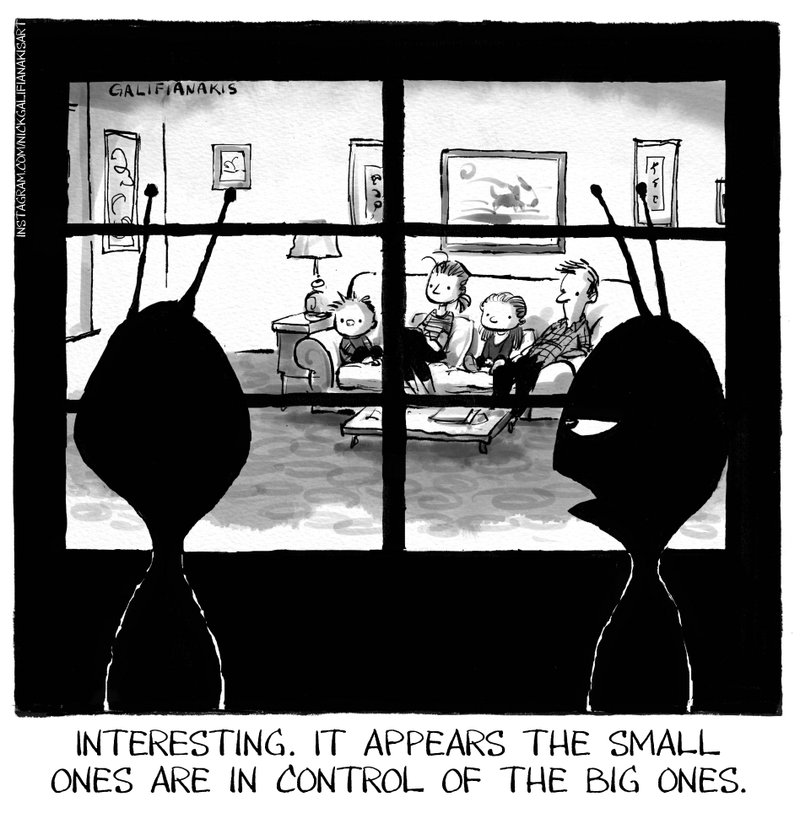DEAR CAROLYN: I live in a house with two indoor cats with a litter box. My eighth-grade daughter is supposed to be responsible for sweeping and scooping litter but does a terrible, lackadaisical job. It's in my laundry room, where I smell and step all over scattered litter. Half the time the litter appears untouched despite my constant pleas.
I'm sick of constantly reminding and chiding her to clean. I secretly want the cats gone, as the litter stinks and also they shed everywhere, and I hate my clean laundry being near filthy cat litter. She just laughs and says I'm too picky.
What can I do? I am ready to move out rather than continue being ignored.
-- C.
DEAR READER: You can please, please be the parent.
Please.
As the adult and head or co-head of the household, you decide how "picky" you are. Right now, by letting your daughter blow off her chores and laugh at you, you are deciding instead to take orders from a middle-schooler. And eventually, quite possibly, launch an entitled and disrespectful person into the citizenry.
Please, I beg you, don't. Not another one.
The older she gets, the less effective these measures will be, so apply them now:
Presumably your daughter has friends? Hobbies? A phone? A favorite restaurant? Presumably you take her back to school on a Friday or Saturday for a game or a dance or a play her friends are in? Presumably she wants you to buy her things beyond basic sustenance?
These are privileges. Access to every single one of them needs to be, and has needed to be since she was old enough to understand, behind a door she can unlock only through satisfactory completion of her assigned chores.
Households are micro-communities and communities run on the respectful participation of every capable person. This is the social contract we would all appreciate your teaching her now, while you can, with the simple expectation of a fair contribution (chores; respect for shared spaces like the laundry room).
Eventually we do most of this out of consideration for others, on an honor system -- my neighbor can't take my car keys away when I blow off mowing the lawn. However, the parent/guardian hierarchy is essential at the teaching stage, using age-appropriate expectations and consequences to help establish the baseline cause-and-effect connections: as in, if you don't behave nicely, then you won't have nice things. Such as, people who like you.
Plus, it can't hurt to prepare her for laws, bylaws and bosses, either, and the citations/fines/pink slips they can slap her with when she decides they're being "too picky."
By your own description, you're behind on this, so clarity is essential -- of mission, of expression, and of execution.
First, you define what is satisfactory: "The cats are your responsibility. That includes cleaning the litter box daily, sweeping the floor around it, and vacuuming once a week."
Next, you supply or set up the necessary tools. Good litter box, broom, dustpan, trash bin, accessible vacuum cleaner, and a demonstration of what you expect, if needed, or just watch as she does it so you know she knows what your standards are. Don't assume anyone knows this, especially a kid.
Next, you attach clear consequences for a "terrible job." Fold them in to your daily life without shouting or drama. Do. Not. Cave:
"Sure, Sweetie, I'll take you to Kate's house -- as soon as you clean up the litter box. For real this time." "Hey everybody, we're going out to the Fat Fry -- we'll leave at 7 as long as everyone's done with homework and chores." "Yes, I realize 'everyone' has a phone. In this house, it's everyone who does his or her share."
If her entitlement has already ripened to the point of defiance and she laughs her way out the door to do whatever she wants, then that's when you talk to a good family therapist for serious remedial action.
When -- not if -- she pushes back against the new sheriff, make one clear statement: "You're not a little kid anymore. You're old enough to be accountable." It can be our secret that she's been old enough for years.
Your pliancy suggests the risk of swinging this way probably verges on zero, but it's worth mentioning that the other extreme isn't any better, of punitive expectations and hair-trigger corrections. A loving and forgiving household is the ideal teacher of community values -- where the roles are clear, the consequences are natural, the respect is mutual, the battles are judiciously picked, and the police state is unnecessary.
PEP -- the Parent Encouragement Program -- is an excellent resource for finding this kind of balance, and it offers quick, inexpensive courses online at pepparent.org. I suggest you start with, "Why Don't My Kids Listen to Me?"
Chat online with Carolyn at 11 a.m. each Friday at washingtonpost.com. Write to Tell Me About It in care of The Washington Post, Style Plus, 1150 15th St. N.W., Washington, D.C. 20071; or email
Style on 02/17/2019

